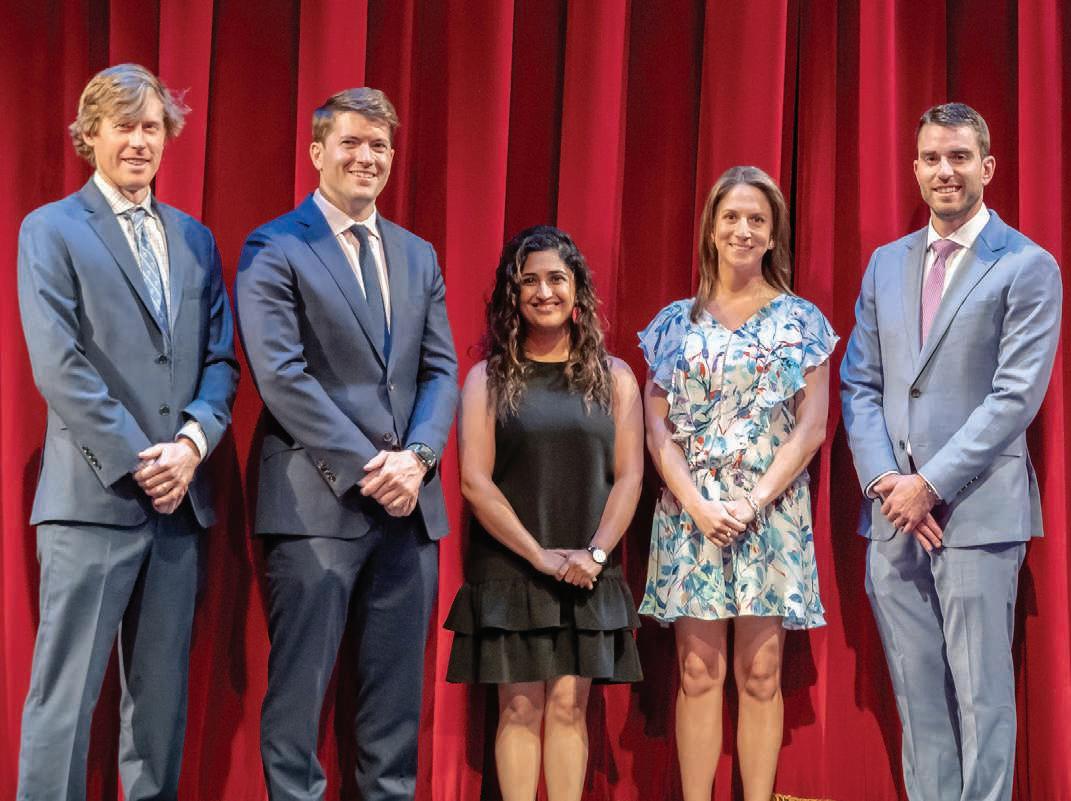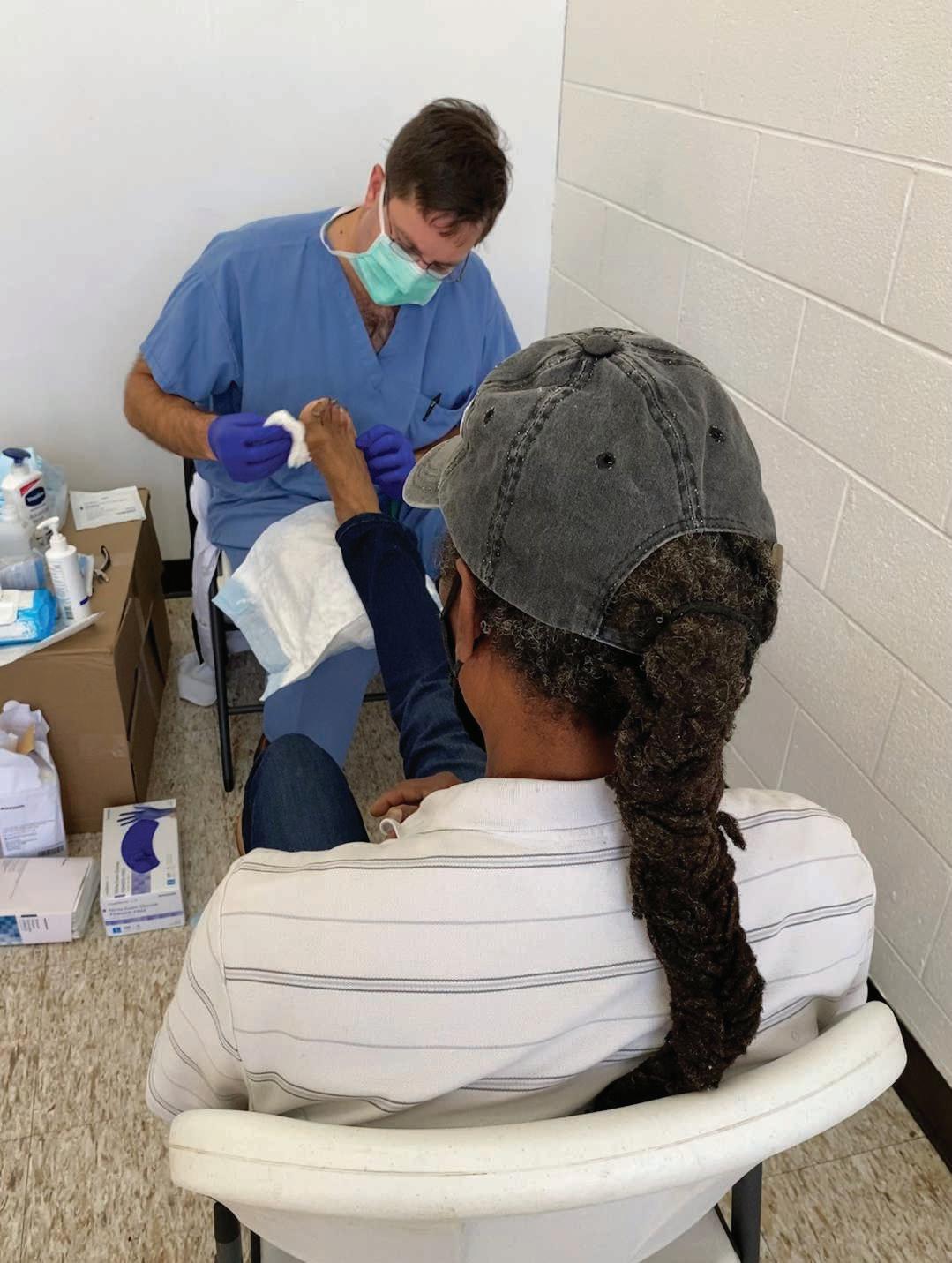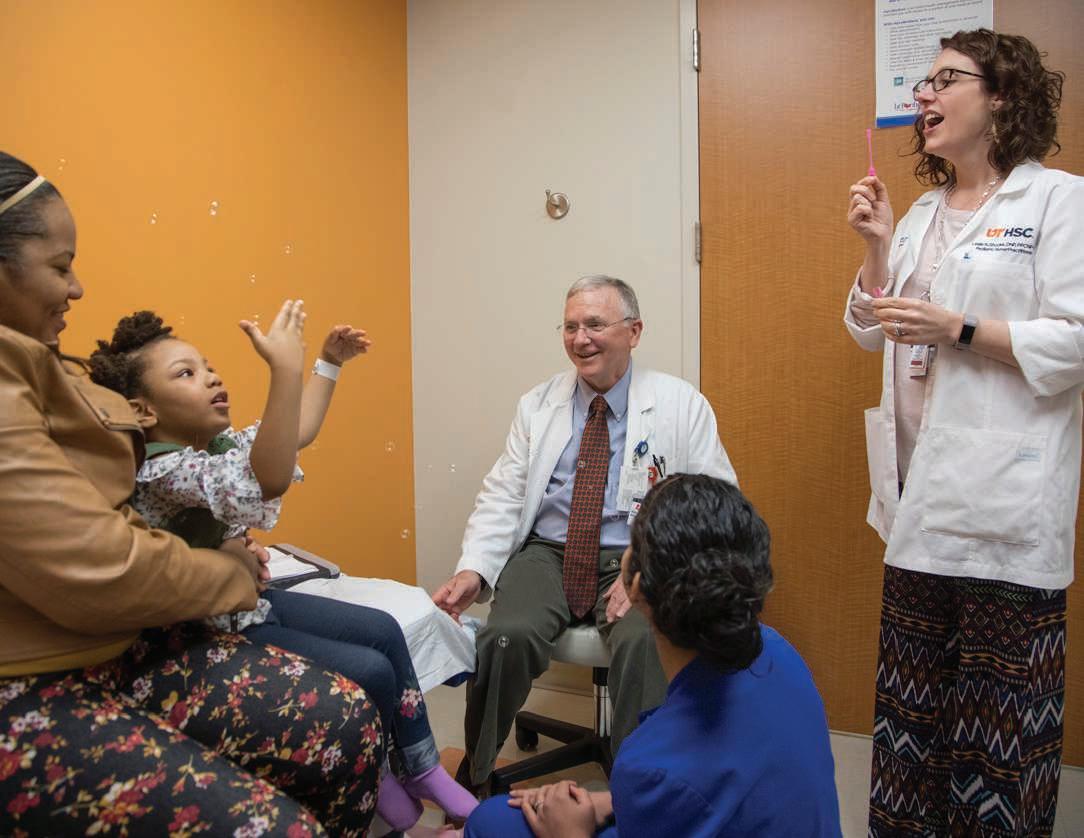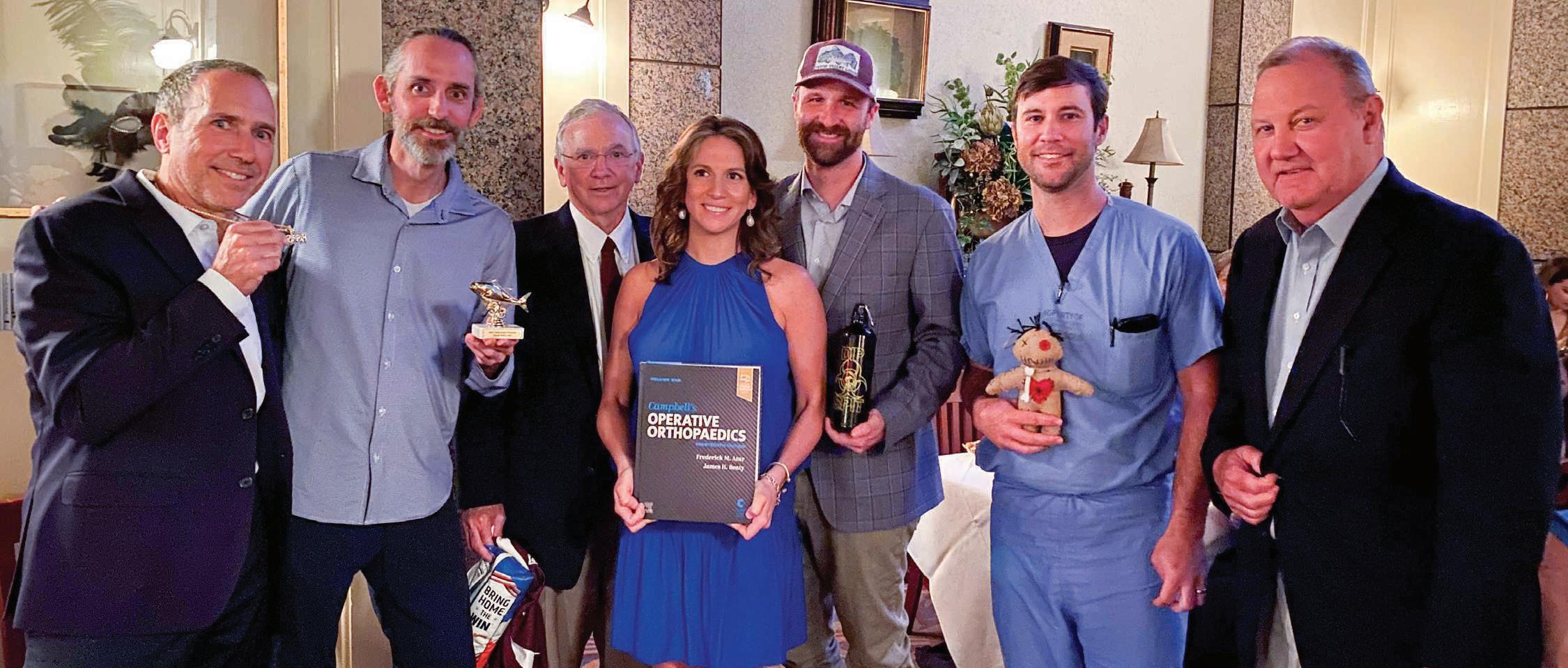
6 minute read
Fellowship Overview
FELLOWSHIP PROGRAM
The Campbell Clinic Foundation is proud to offer some of the most highly sought-after orthopaedic surgery fellowships in the United States, providing each fellow with a well-rounded foundation in the science and art of orthopaedic surgery so they may advance as practitioners and physician leaders. We pride ourselves on fostering surgeons “the Campbell way”.
While patient care and medical knowledge are the most visible core competencies, each fellowship provides comprehensive practice-based learning. Hospital and surgical experiences include daily rounds on all inpatients, postoperative checks before discharge, seeing all consults on inpatients to evaluate conditions and diagnostic data, discussing patients with attending staff physicians, serving as fi rst assistant to primary surgeon and overseeing postoperative orders. Fellows supervise residents and participate in surgery. Scholarly experiences, local and national conferences, presentations, and lecture series enhance profi ciency and medical acumen. System-based practice skills are refi ned by the completion of necessary administrative roles required for both inpatient and outpatient care. Interpersonal and communication skills and professionalism are reenforced by one-on-one interaction with faculty members, who instruct and evaluate fellows’ professional behavior and ability to communicate with patients of all ages and circumstances. All fellows are expected to participate in at least one research project during the fellowship year that will result in presentation, publication, or both. Support from the Campbell Clinic Foundation are available for clinical and basic science research.
Sports Medicine and Shoulder Surgery Fellowship
Frederick M. Azar, MD, Professor, Sports Medicine Program Director Tyler J. Brolin, MD, Assistant Professor and Associate Program Director, Shoulder and Elbow Surgery David L. Bernholt, MD, Clinical Instructor, Sports Medicine Thomas W. Throckmorton, MD, Professor, Shoulder and Elbow Surgery The Sports Medicine and Shoulder Surgery Fellowship offers a truly unique experience that combines six months of both Sports Medicine and Shoulder and Elbow fellowship training. This hybrid program allows each fellow exposure to a breadth of both routine and complex pathology of the knee, shoulder, and elbow with unique focuses on shoulder arthroplasty, open shoulder surgery, and multi-ligamentous knee reconstruction. Fellows also have the opportunity to gain training in hip arthroscopy, hip preservation, and pediatric sports medicine. An integral part of the fellowship is the opportunity to participate in high-level team coverage which includes sports medicine clinics, team and event coverage, and pre-participation physical exams for the Memphis Grizzlies, Memphis Hustle of the G League, 901 FC of the United Soccer League, Memphis Redbirds AAA Baseball, University of Memphis, Christian Brothers University, and Rhodes College. Clinical experiences are focused at Campbell Clinic, Campbell Clinic Ambulatory Surgery Centers, and major metropolitan hospitals including both a pediatric and adult Level 1 trauma hospital. Fellows are exposed to practice management and coding training to gain invaluable knowledge on how to run a successful private practice. They are an integral part of a robust Sports/Shoulder and Elbow research division that will foster academic pursuits.
Hand Surgery Fellowship
Benjamin M. Mauck, MD, Associate Professor, Hand Program Director James H. Calandruccio, MD, Associate Professor Norfl eet B. Thompson, MD, Instructor William J. ‘Jake’ Weller, MD, Instructor The University of Tennessee Health Science Center – Campbell Clinic Department of Orthopaedic Surgery Fellowship in Hand Surgery is an accredited 12-month fellowship in surgery of the adult hand directed by fellowship-trained specialists, with the Certifi cate of Added Qualifi cations (CAQ) in Hand Surgery. Clinic time is focused on diagnosis and care of hand conditions as well as treatment for nonsurgical problems. Extensive exposure to surgical management of acute and reconstructive upper extremity procedures in adults and children is a strength of the Fellowship. Hospital and surgical experiences span various facilities, including Baptist Memorial Health Care, Methodist Le Bonheur Health Care, Regional One Health, and Campbell Clinic Surgery Centers.

Foot and Ankle Surgery Fellowship
Clayton C. Bettin, MD, Assistant Professor, Foot and Ankle Fellowship Director Benjamin J. Grear, MD, Instructor
G. Andrew Murphy, MD, Associate Professor David R. Richardson, MD, Associate Professor Carson M. Rider, MD, Instructor The University of Tennessee Health Science Center – Campbell Clinic Department of Orthopaedic Surgery Fellowship in Foot and Ankle Surgery is a 12-month fellowship in surgery of the adult foot and ankle. Two fellowship opportunities are available each academic year. Five days each week are spent with the foot and ankle staff in an offi ce practice nearly exclusively weighted toward foot and ankle problems. There is excellent exposure to acute and reconstructive surgery of the foot and ankle, as well as a broad exposure to clinical nonsurgical problems. There is no mandatory night call. The fellowship is focused on education (as opposed to routine clinical tasks), with ample time for reading and research. Experiences include performing all procedures, including removal of pins, administration of injections, and routine foot care. Hospital and surgical experiences include sharing daily rounds with staff physicians for all inpatients, serving as fi rst assistants to primary surgeons, writing postoperative orders, brief operative notes, dictating all operative notes, and performing anesthetic blocks as directed.

Pediatric Fellowship
Derek M. Kelly, MD, Professor, Pediatric Orthopaedic Fellowship Director James H. Beaty, MD, Professor Jeffrey R. Sawyer, MD, Professor Benjamin W. Sheffer, MD, Assistant Professor
David D. Spence, MD, Assistant Professor William C. Warner, MD, Professor The Pediatric Orthopaedic Surgery Fellowship is designed to provide subspecialty training in all areas of pediatric orthopaedic surgery with one of the top pediatric orthopaedic teams in the country. The 12-month


ACGME- and POSNA-accredited fellowship program combines clinical training and research, preparing surgeons for a career in both private practice and academic settings. Training locations include Le Bonheur Children’s Hospital and Campbell Clinic Orthopaedics. The fellowship offers extensive exposure to pediatric conditions including trauma, scoliosis, clubfoot, hip diseases, limb deformities, tumors, hand and upper extremity conditions, sports orthopaedics, metabolic and genetic conditions, neuromuscular disorders, cerebral palsy, myelomeningocele, degenerative diseases, congenital conditions, and other conditions that affect the spine, hip, foot and ankle, and hand.
Trauma Fellowship
John C. Weinlein, MD, Assistant Professor, Trauma Fellowship Director Matthew I. Rudloff, MD, Assistant Professor, Assistant Trauma Program Director Michael J. Beebe, MD, Instructor Christopher T. Cosgrove, MD, Instructor The University of Tennessee Health Science Center – Campbell Clinic Trauma Fellowship participates in the match program and is Orthopaedic Trauma Association (OTA) accredited, offering a comprehensive trauma experience at a high-volume Level I trauma center serving as a referral facility for fi ve states including Tennessee, Arkansas, Mississippi, Missouri, and Kentucky with four orthopaedic traumatologists on staff. This program is primarily focused on the operative and nonoperative management of complex polytrauma including pelvic, acetabular, and periarticular fractures; reconstructive fracture management including nonunions, malunions, and deformity correction; and clinical investigation and research, which provides extensive operative exposure of complex fractures with an emphasis on pelvic and acetabular injuries. Interaction with two orthopaedic trauma teams includes daily morning report/fracture conferences, which are attended by residents, fellow, and staff and include discussion of indications and preoperative planning as well as review of past operative and nonoperative cases. The fellow then has fi rst choice of operative cases in a minimum of three orthopaedic trauma rooms that are available daily. The fellow has opportunities to pursue additional areas of interest including arthroplasty for certain fractures and deformity correction.





